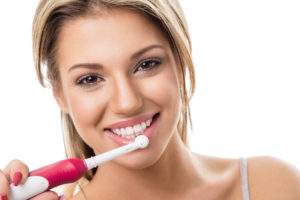 Does biting into an ice cream cone or taking that first sip of hot coffee in the morning make you want to say “ouch?” If so, your dentist in Ponte Vedra Beach says listen up. Tooth sensitivity is not just a natural side effect of getting older. In fact, it can indicate a few things — maybe even a dental emergency. Keep reading to find out why your teeth may be a little more sensitive these days and what you can do to stop it.
Does biting into an ice cream cone or taking that first sip of hot coffee in the morning make you want to say “ouch?” If so, your dentist in Ponte Vedra Beach says listen up. Tooth sensitivity is not just a natural side effect of getting older. In fact, it can indicate a few things — maybe even a dental emergency. Keep reading to find out why your teeth may be a little more sensitive these days and what you can do to stop it.
Primary Factors Causing Tooth Sensitivity
There are a number of factors that can cause your teeth to be sensitive to heat and cold, and you may notice increased sensitivity to heat and cold at different times. Some of the most common reasons for sensitive teeth include:
- Aggressive tooth brushing, like putting a little “elbow grease” into your technique. It may feel like you are getting a better clean, but this practice will wear away at the tooth enamel and cause discomfort to heat and cold.
- Brushing your teeth with anything other than a toothpaste that has been approved by the American Dental Association — DIY formulas may be too abrasive for the tooth enamel.
- Eating and drinking too many highly acidic foods and beverages, like lemons, limes, carbonated drinks like soda and mineral water, and others.
- Having a malfunctioning dental restoration, like a leaking filling or broken dental crown.
- Gum recession which has left the root of your tooth exposed. Recession is frequently caused by gum disease or aggressive tooth brushing.
- Tooth decay caused by insufficient oral hygiene.
- Nighttime teeth grinding, or the condition known as bruxism.
How to Stop Sensitivity
The steps you take to curb tooth sensitivity may range from tweaking your dental hygiene habits to eliminating carbonated beverages from your diet. For others, you may need to visit your dentist. Dr. Harth can evaluate your tooth structure to determine just what is causing the sensitivity and then make a recommendation for treatment. If it is caused by tooth decay or broken dental work, restorative dental care will get you out of pain and on with your life.
Brushing with an anti-sensitivity toothpaste can also provide significant help for combating tooth sensitivity. Ask Dr. Harth for a specific recommendation.
Some tips for stopping sensitivity include:
- Brushing softly in gentle circles
- Using only toothpaste that have been approved by the American Dental Association
- Brushing with an anti-sensitivity toothpaste
- Visiting your dentist every six months for routine checkups and cleanings
- Limiting the number of acidic foods and carbonated beverages you consume
- Seeking treatment for nighttime teeth grinding
Don’t hesitate to talk to your dentist about your sensitivity! Finding an effective solution is important for your continued oral health.
About the Dentist
Dr. Kristopher Harth is a comprehensive dentist offering families and friends of all ages superior dental care. To learn more about his general, restorative, or cosmetic services, you are invited to contact your dentist in Ponte Vedra at 904-285-7711.



